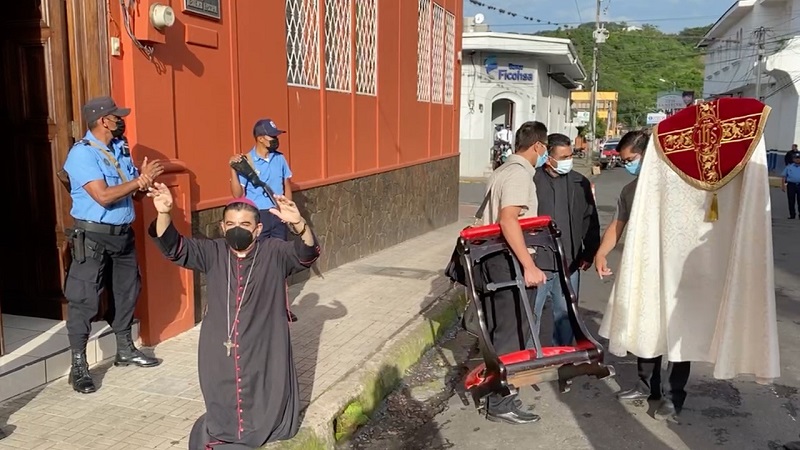Managua - Cardinal Leopoldo Brenes, the archbishop of Managua, Nicaragua, met Rolando Álvarez the bishop of Matagalpa, just hours after Bishop Alvares was abducted by the Daniel Ortega dictatorship during the early hours of August 19.
In a statement released this afternoon, the archbishop reported that the "physical condition" of Álvarez "has deteriorated," but "his mind and spirit are strong."
In its message this afternoon, the archdiocese of Managua expressed "its solidarity and closeness with the sister diocese of Matagalpa, in the face of the sad event experienced this morning."
“The Archbishop Cardinal Leopoldo Brenes had the opportunity to visit and talk with Bishop Álvarez in a residence of his relatives, showing his fraternal esteem in the name of our Nicaraguan church,” the archdiocese said.
The bishop is being held there under house arrest since August 4.

"Bishop Álvarez has expressed his confidence in everyone's prayer in the face of this difficult situation that we are going through in ecclesial communion," the statement said.
The archdiocese of Managua stressed that "prayer is the strength of the Christian," so "we invite you to continue imploring Christ to intercede and watch over this little flock of his."
"We hope that reason, as well as respectful understanding, open the way to the solution of this critical and complex situation for everyone," the message concluded.
According to police, the priests and seminarians detained in Managua are being held "in the Directorate of Judicial Assistance," in a prison known as "El Chipote," infamous for torture carried out on opponents of the Ortega dictatorship.
Speaking with ACI Prensa Aug. 19, the lawyer Martha Patricia Molina Montenegro said that for the abducted bishop "there are two outcomes," which are "exile or jail."
However, she said, Álvarez "will never tolerate" leaving Nicaragua, "and even less so when he found out that the rest of the priests and seminarians were sent to the torture prison known as El Chipote."
Ortega has had a complicated relationship with Nicaragua’s predominant religion and its leaders for more than four decades. The former Marxist guerrilla infuriated the Vatican in the 1980s, but gradually forged an alliance with the church as he moved to regain the presidency in 2007 after a long period out of power. Now he appears to once again see political benefit in direct confrontation.
In March, Nicaragua expelled the papal nuncio, the Vatican’s top diplomat in Nicaragua.
The government had previously shut down eight radio stations and one television channel in Matagalpa province, north of Managua. Seven of the radio stations were run by the church.
Last Friday Monsignor Juan Antonio Cruz, the Vatican’s permanent observer to the Organization of American States, expressed concern about the situation and asked both parties to “seek ways of understanding.”
-CNA/NBC